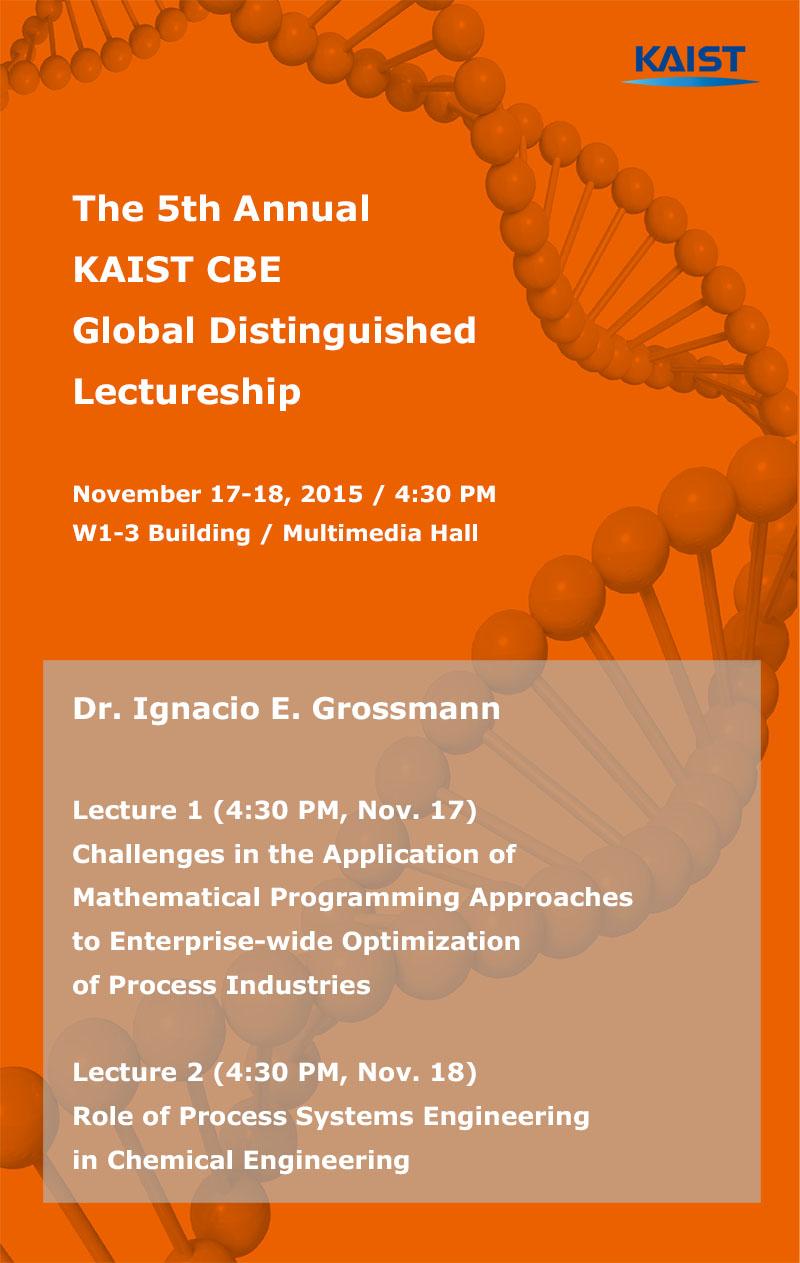- The 5th Annual KAIST CBE Global Distinguished Lectureship - Dr. Ignacio E. Grossmann, Carnegie Mellon University
- 관리자 |
- 2015-11-06 09:39:50|
- 14344
- 2015-11-06 09:39:50|

생명화학공학과에서 11월 17일(화), 18일(수) 이틀 간 “제5회 KAIST CBEAnnual Global Distinguished Lectureship”을 개최합니다.
올해 5회 행사에 연사로 모신 분은Carnegie Mellon University의 R. R. Dean University Professor이신 Ignacio E. Grossmann 교수님입니다.
Grossmann 교수님 강연은 17일(화)과 18일(수) 각각 오후 4시 30분에 1층 영상강의실에서 진행되며, 별도의 등록 절차 없이 관심 있는 분은 누구나 참여할 수 있습니다.
17일(화)에는 “Challenges in the Application of MathematicalProgramming Approaches to Enterprise-wide Optimization of Process Industries”라는 주제로 강연이 진행됩니다.
그리고 18일(수)에는 학과 외부세미나 시간에 “Role of Process SystemsEngineering in Chemical Engineering”라는 주제로 두 번째 강연이 진행되고 강의에 앞서 오후 4시부터 영상강의실 앞에서 리셉션이 진행됩니다.
Global DistinguishedLectureship
행사에 생명화학공학과 학생 및 연구원 여러분의 많은 관심과 참여 바랍니다.
.
The 5th Annual KAIST CBE
Global Distinguished Lectureship
Department of Chemical & Biomolecular Engineering
KAIST
November 17-18, 2015 / 4:30 PM
W1-3 Building / Multimedia Hall
Dr. Ignacio E. Grossmann
Rudolph R. and Florence Dean University Professor ofChemical Engineering
Center for Advanced Process Decision-making
CarnegieMellon University
Lecture 1
Challengesin the Application of Mathematical Programming Approaches to Enterprise-wideOptimization of Process Industries
November 17, Tuesday / 4:30 PM
Enterprise-wideoptimization (EWO) is a new emerging area that lies at the interface ofchemical engineering and operations research, and has become a major goal inthe process industries due to the increasing pressures for remainingcompetitive in the global marketplace. EWO involves optimizing the operationsof supply, production and distribution activities of a company to reduce costsand inventories. A major focus in EWO is the optimization of manufacturingplants as part of the overall optimization of the supply chain. Majoroperational items include production planning, scheduling, and control. Thistalk provides an overview of major modeling and computational challenges in thedevelopment of deterministic and stochastic linear/nonlinear mixed-integer optimizationmodels for planning and scheduling for the optimization of plants and entiresupply chains that are involved in EWO problems. We address the following majorchallenges in this area: a) multi-scale optimization, b) linear vs. nonlinearmodels, c) handling of uncertainty and disruption, d) multiobjective andmultilevel optimization. We illustrate these challenges in areas such asindustrial gases, petroleum processing, and chemical process networks. Theseproblems have been addressed in collaboration with industry, and have led tosubstantial economic savings.
Lecture 2
Role ofProcess Systems Engineering in Chemical Engineering
November 18, Wednesday / 4:30 PM
In this lecture we give a general overview ofthe nature of Process Systems Engineering, discuss some current major trends,and show how it fits in this Chemical Engineering and the role it might play inthe future. After briefly reviewing the history of Chemical Engineering, wehighlight how academic research over the last decade has had a strong pushtowards science, largely due to emergence of areas like nanotechnology andbiotechnology, which has caused some disconnect between academia and industry.However, despite these trends, Process Systems Engineering (PSE) remains a corearea in Chemical Engineering that one the one hand has expanded its scope fromthe process engineering level down to the molecular level, and up to theenterprise and global level. We describe three major trends in Process SystemsEngineering that have emerged over the last decade and that can potentiallyhelp the industry to innovate and to remain competitive. First, we describeefforts for simultaneous product and process design, where the emphasis lies intying the molecular structure of the products with the processing andmacroscopic properties of the product. Second, we describe work that is aimedat modeling and optimizing processes for effectively exploiting fossil fuels likeshale gas and alternative sources like biomass. We also address the issue ofefficiently managing natural resources such as water. Third, we describeresearch efforts in enterprise-wide optimization that are aimed at designingand operating supply chains for the process industry in which planning,scheduling and control can be integrated more effectively.
| 첨부파일 |
|
|---|

